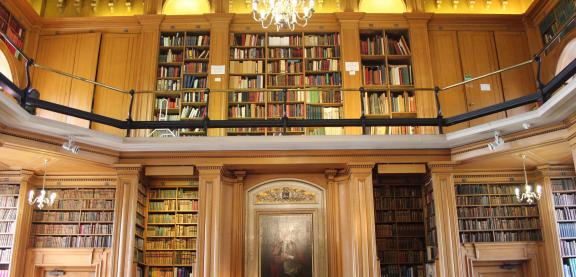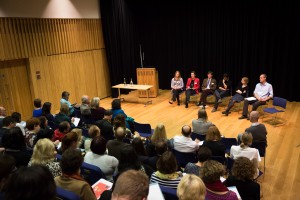With the cancellation of first-year exams in Oxford earlier this summer, several students took the opportunity to respond creatively through the visual arts and creative writing to some of the literary works they had studied earlier in the year, or works they plan to study next year. Their projects included a Lorca play turned into a short story, a García Márquez short story turned into a play, and an election campaign poster for Coronel Aureliano Buendía.
Here, and in next week’s post, are samples from four projects, all under the direction of Dr Imogen Choi:
Imogen Lewis (French and Spanish, Exeter College)

“For my final creative piece of the first year I decided to focus on Golden Age poetry (specifically sonnets), and its presentation of the much-idealised Petrarchan Woman. I studied the works of three of the best-known Spanish poets: Góngora, Quevedo, and Sor Juana Ines de la Cruz. While the ‘conceptismo’ aspect of these poems is easily captured in a painting (i.e. one can easily picture and reproduce a woman’s ‘pearly white teeth’ or ‘alabaster’ neck), it is the notorious ‘culteranismo’ aspect (the essence of marked opposition and play-on-words) that is much harder to depict. While Góngora captures the quintessential “cabellos de oro” of the Petrarchan woman, Quevedo ponders the “figura de la hermosura pasada”, and Sor Juana even begins to question identity and the representation of idealised beauty through the figures of painting and “retratos”. On the left two thirds of the piece stands the idealised, beguiling Petrarchan woman, but as the eye naturally moves from left to right we see what is really hidden behind the appearance of these poems – latent decay and and cynicism about age and beauty.”
Costanza Levy (Exeter College)
Eyes of a Blue Dog is a short play in English. It is an adaptation of Gabriel García Márquez’s short story, Ojos de perro azul, which narrates the relationship between a man and a woman who only meet in their dreams. The ambiguous narrative explores death, desire and the passing of time through the lens of a dreamworld. This theatrical adaptation uses dialogue, a stark set design, blue lighting and the music Charvela Vargas to evoke the central themes of Márquez’s modernist work.
Eyes of a Blue Dog
‘La llorona’ by Charvela Vargas fades in.
A deep blue light fills the stage.
‘He’ is standing to the left of the bed. ‘She’ is sitting on the edge of the bed. She looks at him, perplexed. He stares back at her for some time.
‘La Llorona’ fades out at 1 minute 24 seconds.
1
He They’re so bright.
She What?
He Your eyes. They’re so bright. And blue. Grey-blue. Ash-blue.
She I’ve been told that before.
He Like a blue dog. The eyes of a blue dog.
The light flickers, then it is dark, except for the candle. ‘He’ lights a cigarette. A harsh white light shines on ‘She’. She is still. There is the sound of fire burning.
[…]
He You’re like a statue. Like some copper statue I’d find in a museum.
He walks around her.
But I recognise you. I’ve seen you before. Who are you?
[…]
She I wish I could remember where I’ve gone looking for you.
He Me too. In some part of the world, ‘eyes of a blue dog’ is scrawled over all the walls, over all the floors, posted through all the letterboxes.
Every night, I tell myself, tomorrow. Tomorrow you’ll remember this, and you’ll know how to find her. Then every morning, I wake up, and it’s all gone.
‘He’ lights a cigarette.
I wish there was something. Something that gave us some sort of idea.
The light flickers.
A white light shines on ‘She’. She shivers. The shiver becomes a shudder. There is the sound of fire burning. She crumples to the floor.
It is dark, except for the candle and the cigarette.


